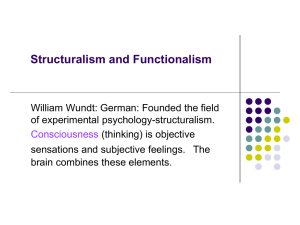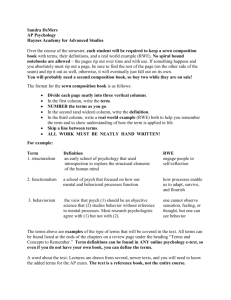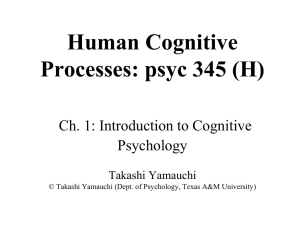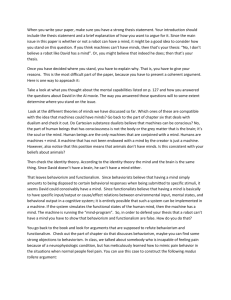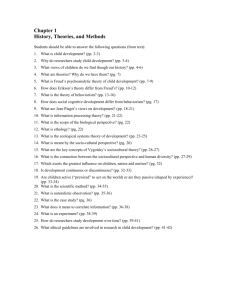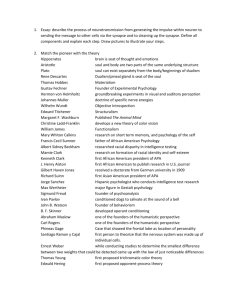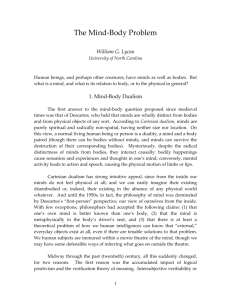Ch-6 Functionalism: Antecedent influences
advertisement
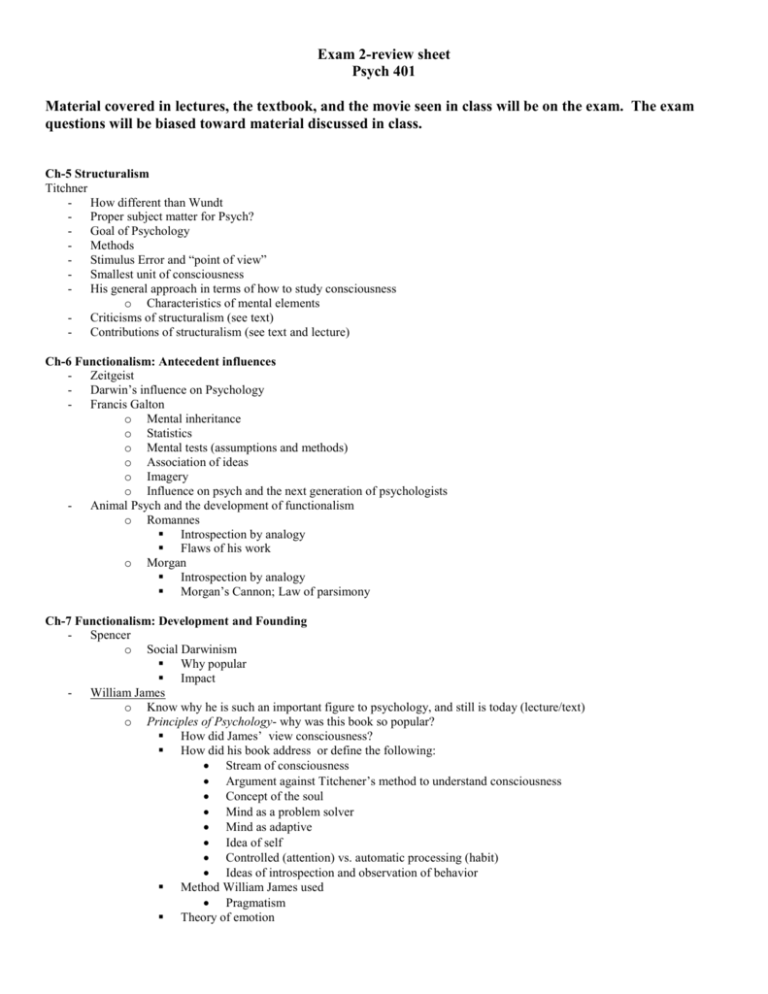
Exam 2-review sheet Psych 401 Material covered in lectures, the textbook, and the movie seen in class will be on the exam. The exam questions will be biased toward material discussed in class. Ch-5 Structuralism Titchner - How different than Wundt - Proper subject matter for Psych? - Goal of Psychology - Methods - Stimulus Error and “point of view” - Smallest unit of consciousness - His general approach in terms of how to study consciousness o Characteristics of mental elements - Criticisms of structuralism (see text) - Contributions of structuralism (see text and lecture) Ch-6 Functionalism: Antecedent influences - Zeitgeist - Darwin’s influence on Psychology - Francis Galton o Mental inheritance o Statistics o Mental tests (assumptions and methods) o Association of ideas o Imagery o Influence on psych and the next generation of psychologists - Animal Psych and the development of functionalism o Romannes Introspection by analogy Flaws of his work o Morgan Introspection by analogy Morgan’s Cannon; Law of parsimony Ch-7 Functionalism: Development and Founding - Spencer o Social Darwinism Why popular Impact - William James o Know why he is such an important figure to psychology, and still is today (lecture/text) o Principles of Psychology- why was this book so popular? How did James’ view consciousness? How did his book address or define the following: Stream of consciousness Argument against Titchener’s method to understand consciousness Concept of the soul Mind as a problem solver Mind as adaptive Idea of self Controlled (attention) vs. automatic processing (habit) Ideas of introspection and observation of behavior Method William James used Pragmatism Theory of emotion - Role of Woman in terms of major contributions to functionalism - Founding of Functionalism o Chicago school o Know how each changed and shaped functional psych o Dewey Reflex arc Other Contributions o Angell Definition of Functionalism; what study and methods used to study. Other themes of functional psychology How he helped make Functionalism a formal school of psychology o Carr How did his ideas change functionalism Contributions o Contributions and Criticisms of Functionalism (see notes and text) Ch –8: Applied Psychology - Why was there a movement toward a practical (applied) psychology - Zeitgeist (especially that associated with Economics) - - - - - G. Stanley Hall (textbook) o What general impact did he have James Catell o Use of statistics o Mental testing (how measured); did statistics confirm his original assumptions about intelligence? o His contributions and his failure Testing movement o Alfred Binet Contributions Assumptions about intelligence and how differed from Cattell’s assumptions Concept of mental age—what is mental age? Impact of his mental test today o Terman o IQ testing o World War I Mental testing Alpha and beta tests How affected applied psychology o Flaws in some of the mental tests created (e.g., Thomas Edison’s) Assumption of knowledge inherited vs. learned Cultural bias Racial bias Clinical movement o Lightner Whitmer Clinical—school psychologist Contributions to psychology o Impact of WWII and the clinical movement Industrial-Organizational Psychology movement o Walter Dill Scott Advertising Employee selection Contributions and impact o Hawthorne Effect o Hugo Munsterberg Forensic psych Findings and contributions USA vs. other countries psych; why functionalism & applied psychology successful in USA Ch-9: Behaviorism: Antecedent influences - Animal psych and Behaviorism - E.L. Thorndike o Connectionism (S-R psychology) o Views on studying mental processing and the use of introspection o Why considered the bridge between functionalism and behaviorism o Puzzle box o Law of effect o Contributions to psychology - Ivan Pavlov o Conditioned reflexes o “Psychic reflexes” o Classical conditioning (how works; extinction; spontaneous recovery) o Work on Neurosis (experimental findings & conclusions) o Impact of work concerning classical conditioning and impact on Neurosis work - Bekhterev o Associated reflexes o Ideas concerning learning and role of mental processing - Russian Objective Psychology (general assumptions) - Influence of functionalism on behaviorism Ch-10: Behaviorism: Beginning - John B. Watson o The publication referred to as “The Behaviorist Manifesto”-- Why was this document important o What did he do to become the founder of Behaviorism o Methodology differences from previous schools o What, according to Behaviorism should be the focus of psychology? What were the methods? How was this different from Functionalism? How was Behaviorism different than Structuralism? Know differences between subject matter, methods, and goals among these 3 schools of thought (see lectures, exercises and review in class) o What did Behaviorism reject from the schools of Functionalism & Structuralism - Methods of behaviorism - Subject matter of behaviorism - Ideas concerning o Instincts o Emotions o Thought - Appeal of Behaviorism - Carl Lashley (text) o Law of mass action o Equipotentiality - Criticisms of Watson’s behaviorism (text) o McDougall Their debate - Contributions of Watson’s behaviorism NOTE: Many compare and contrast questions concerning Structuralism, Functionalism, and Behaviorism. Know the differences and/or similarities in terms of assumptions, methods, and goals.
